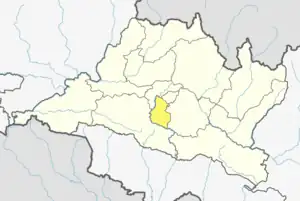Thecho
Thecho is located about 6 km (3.7 mi) south of the main Lalitpur town in Lalitpur district, Godawari Municipality. According to 2011 Nepal census, Thecho has a population of 10,086 living in 2,352 individual households.[1] The offshoot road near the Satdobato segment of the Ring Road leads to Thecho. This roads ultimately leads to Lele and is referred to as Satdobato-Tika Bhairab Road. This road is also called a "Laxmi Prasad Highway" which leads to Hetauda. Thecho has its own unique culture and festivals which include the balkumari jatra,bramayani jatra,nawadurga jatra and sindur jatra locally known as Sinha jatra
Thecho
ठेचो | |
|---|---|
 Thecho Location in Nepal | |
| Coordinates: 27.62°N 85.32°E | |
| Country | Nepal |
| Zone | Bagmati Zone |
| District | Lalitpur District |
| Population (1991) | |
| • Total | 7,140 |
| Time zone | UTC+5:45 (Nepal Time) |
Geography
The total area of the VDC is 3.2 km2 (1.2 sq mi). The main part of this village is situated at a height. On the east of Thecho are Jharuwarashi, Dhapakhel separated by Karmanasa stream. Nakhu River in the west separates it from Bungamati. Sunakothi VDC lies on the north of Thecho while on the south are Chapagaun and Chhampi VDCs. Nakhu river flows down south west of the village and some arable land stretches along this river.
Etymology
Thecho was founded in the 16th century.[2] The initial name of Thecho is believed to be Dharmatharipur. The settlement called “Dyecha” existed initially on the low lands near the river. When a landslide struck the village, villagers shifted to the upper lands, and were hence referred as chhen choy ( Newari - chhen: house, choy: up). The terms chhen choy was modified into Thecho.
Major attractions
Thecho was once popular for milk curd (Khuwa) but nowadays the major production of Thecho is mustard oil.[3]
There are three major religious and social attractions in Thecho. Bramhayeni Temple is the main temple in Thecho. Its most prominent features are the utensils nailed to its walls; they are nailed by families in the name of the souls of their departed members. Balkumari Temple is a shrine located in Lachi Tole and is said to have been constructed in 913 NS (1793 AD). Sorakhutte Pati is a rest house which has a roof supported by 16 pillars.
Major educational institutions
Administrative division
Ward → Main tole → Other places
1 → Maligaun → Jhyalipati, Jogigaun, Salcha, Dhangacha, Dathujho
2 → Tanani→ Pukhusi, Lachhi, Laijho, Pacho
3 → Kuthujho → Dawanani, Suganani, Khachatole
4 → Kusukotole → Sikhachhen, Tunani, Nanigal
5 → Jhochhen → Chhasatole, Guwanani, Lachhi, Chapako, Wanani, Gachhitole, Nhuchhentole
6 → Kutujho → Laijho, Dhokasing,Tanani, Dhaunani, Pukhusi, Twacha, Bakusi
7 → Nhuchhen Tole → Damgonani, Twacha, Pukhusi
8 → Durikhel → Paumagal, lamatar, Ratamata, Pokhari
9 → Tarankhel → Bauwapau, Makathy,Salitar, Lamachaur, Bethegal
Culture
Most of the prominent Newari festivals are observed in Thecho. However, Yomari Puni is considered as main festival. It is celebrated for 4 days starting from the full moon of December. During this festival, Bramhayani, Balkumari, Bhairav and Navadurga are carried around the town in a chariot. The dyo: pukhu: behind the Bramhayani is filled by water from Lele and the chariots are washed. There is a legendary traditional dance of Nawadurga Bhawani of Thecho which is performed every year during Vijaya Dashami.[6]
References
- Central Bureau of Statistics of Nepal: National Population and Housing Census2011 Archived 2013-07-31 at the Wayback Machine
- Singh, Rishi (2005-01-08). "A dark temple and an oil press". The Himalayan Times. Retrieved 2021-07-17.
- Singh, Rishi (2007-08-09). "The power of Mustard". The Himalayan Times. Retrieved 2021-07-17.
- "Hundreds of students affected as locals block road in Lalitpur". The Himalayan Times. 2019-05-17. Retrieved 2021-07-17.
- "THT 10 YEARS AGO: Valley to have two more Newar schools". The Himalayan Times. 2017-02-02. Retrieved 2021-07-17.
- "Nawadurga Bhawani Jatra observed today". The Himalayan Times. 2020-12-31. Retrieved 2021-07-17.
